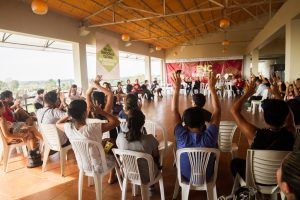Arts and Culture: The Next Open Government Frontier
El arte y la cultura: una nueva frontera para el gobierno abierto
You probably don’t associate open government with the arts very often, but they are more connected than you think. Their relationship usually manifests through initiatives that recognize artists as key spokespeople, able to innovatively and creatively transmit the value and power of open government principles. However, artists and cultural workers are seldom understood as part of a larger and complex cultural sector that faces significant challenges to democratize its policies and public institutions.
Today, the arts and cultural sectors include issues like the cultural and creative industries (CCIs), cultural heritage, cultural rights, cultural diversity, freedom of artistic expression, mobility of artists, access to culture, digital transformationGovernments are working to increase access to and quality of government services, improve transparency, and create opportunities for participation by using information and communications technologies.... More, and, in many countries, the wellbeing of afro-descendants and indigenous peoples.
These sectors constitute a complex political ecosystem made up of cultural organizations, federations, networks, and alliances who advocate for the democratic transformation of cultural policies. They also demand accountability and changes to the practices of ministries of culture, arts councils, and other local institutions historically characterized by their centralism, verticality, and opacity.
In the next decade, the arts and cultural sectors should be integrated into the open government agenda, explicitly and coherently. This effort should not only focus on artists and creative workers but on the broader relationship between the culture and key sustainable development issues like health, educationAccountability within the public education system is key to improving outcomes and attainment, and accountability is nearly impossible without transparent policies and opportunities for participation ..., and peace. For the arts and cultural sectors, the open government agenda should constitute a critical opportunity to strengthen cultural diversity and advance cultural rights, generating sustainable (fair, equitable, transparent, and informed) cultural governance systems.
An open government agenda that includes the arts and cultural sectors will be able to connect with other regional and global players, including institutions like UNESCO and its 2005 Convention, which has already identified hundreds of civil society organizations that work to democratize cultural governance. Bringing these initiatives into the conversation about the future of open government is crucial to enrich and expand a global discussion on the relationship between open government and culture, bringing innovative advocacy experiences, emerging issues, and new civic languages to the forefront.
A recent study funded by ILDA on the relationship between open dataBy opening up data and making it sharable and reusable, governments can enable informed debate, better decision making, and the development of innovative new services. Technical specifications: Polici... and cultural governance in Peru supports this claim and underlines the transformative potential of this agenda at the national and local levels. Local governments are in a key position to develop pertinent and purpose-led open data agendas that can benefit local arts and cultural sectors.
The report also proposes a new OGP policy area for the arts and cultural sectors that could encourage more OGP commitments. Currently, only 0.4% (19 in total) are related to the arts and culture (with seven related to open data practices). This would also contribute to mobilizing much-needed resources to conduct new research on this topic and implement targeted training programs. A new policy area like this constitutes a new frontier for open government and an opportunity to extend its reach and impact by connecting to a rich and diverse community interested in democratizing cultural governance.
Es probable que normalmente no asocies al gobierno abierto con el arte, pero ambos conceptos están más relacionados de lo que piensas. Su relación se manifiesta a través de iniciativas que reconocen a artistas como voceros y voceras que tienen la capacidad de transmitir el potencial de los principios de gobierno abierto de forma innovadora y creativa. Sin embargo, los artistas y trabajadores de la cultura rara vez se consideran como parte del complejo cultural más amplio que está enfrentando retos importantes para democratizas sus políticas e instituciones públicas.
Hoy, el sector del arte y la cultura incluye temas como las industrias culturales y creativas, el patrimonio cultural, los derechos culturales, la diversidad cultural, la libertad de expresión artística, la movilidad de las artes, el acceso a la cultura, la transformación digital y, en muchos países, el bienestar de las personas afrodescendientes y los pueblos indígenas.
Estos sectores constituyen un ecosistema político complejo formado por organizaciones culturales, federaciones, redes y alianzas que promueven la transformación democrática de las políticas culturales. Además, exigen a los ministerios de cultura, consejos de cultura y otras instituciones que históricamente se han caracterizado por su centralismo, verticalidad y opacidad que rindan cuentas y apliquen cambios en sus prácticas.
La próxima década, los sectores del arte y la cultura deberán integrarse a la agenda del gobierno abierto de forma explícita y coherente. Este esfuerzo no deberá enfocarse únicamente en artistas y trabajadores creativos, sino también en la relación entre la cultura y temas de desarrollo sostenible como la salud, educación y la paz. Para los sectores del arte y la cultura, la agenda de gobierno abierto debe ser una oportunidad clave para fortalecer la diversidad cultural y promover los derechos culturales, creando sistemas de gobernanza cultural sostenibles (justos, equitativos, transparentes e informados).
Una agenda de gobierno abierto que incluye las artes y la cultura podrá vincularse de mejor manera con otros actores regionales y globales, incluyendo a instituciones como la UNESCO y su Convención 2005, la cual ya ha identificado a cientos de organizaciones de la sociedad civil que trabajan por democratizar la gobernanza cultural. Incorporar estas iniciativas a la conversación sobre el futuro del gobierno abierto es fundamental para enriquecer y ampliar la discusión sobre la relación entre el gobierno abierto y la cultura, poniendo experiencias de incidencia innovadoras, temas emergentes y nuevos lenguajes cívicos en el centro.
Un estudio reciente sobre la relación entre los datos abiertos y la gobernanza cultural en Perú que apoyó ILDA respalda esta afirmación y resalta el potencial transformador de esta agenda, no solo a nivel nacional, sino también al subnacional: los gobiernos locales están en una posición clave para desarrollar agendas de datos abiertos pertinentes que pueden beneficiar a los sectores locales de las artes y la cultura.
El informe, además, propone una nueva área de política para OGP, el sector de las artes y la cultura, el cual podría promover la creación de más compromisos. Actualmente, solo el 0.4% (19 en total) se relacionan con el arte y la cultura (de los cuales siente se relacionan con prácticas de datos abiertos). Esto podría contribuir a movilizar recursos para llevar a cabo nuevas investigaciones sobre este tema e implementar programas de capacitación mejor dirigidos. Una nueva área de política como esta constituye una nueva frontera para el gobierno abierto y es una oportunidad para ampliar su alcance e impacto, conectando a la comunidad interesada en la democratización de la gobernanza cultural.
No comments yet
Related Content
 Challenges and Solutions
Challenges and Solutions
10 Lessons from 10 Years of OGP
OGP Deputy CEO Joe Powell shares reflections on how OGP’s experience can inform some of the most critical policy debates facing the world today.

One Month to Make 2021 Democracy and Open Government Summits Count
With the OGP Global Summit and Summit for Democracy just around the corner, we share three steps for the open government community to take to ensure the events deliver concrete…
 Challenges and Solutions
Challenges and Solutions
OGP at 10, EITI at 20: Where to next?
Since its creation in 2011, the Open Government Partnership (OGP) has successfully promoted open government reforms in 78 countries. Of these...


Leave a Reply